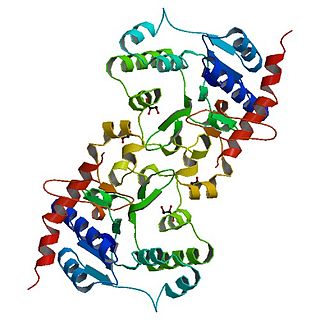| hydroxymandelonitrile glucosyltransferase | |||||||||
|---|---|---|---|---|---|---|---|---|---|
| Identifiers | |||||||||
| EC no. | 2.4.1.178 | ||||||||
| CAS no. | 89287-39-8 | ||||||||
| Databases | |||||||||
| IntEnz | IntEnz view | ||||||||
| BRENDA | BRENDA entry | ||||||||
| ExPASy | NiceZyme view | ||||||||
| KEGG | KEGG entry | ||||||||
| MetaCyc | metabolic pathway | ||||||||
| PRIAM | profile | ||||||||
| PDB structures | RCSB PDB PDBe PDBsum | ||||||||
| Gene Ontology | AmiGO / QuickGO | ||||||||
| |||||||||
In enzymology, a hydroxymandelonitrile glucosyltransferase (EC 2.4.1.178) is an enzyme that catalyzes the chemical reaction
- UDP-glucose + 4-hydroxymandelonitrile UDP + taxiphyllin
Thus, the two substrates of this enzyme are UDP-glucose and 4-hydroxymandelonitrile, whereas its two products are UDP and taxiphyllin.
This enzyme belongs to the family of glycosyltransferases, specifically the hexosyltransferases. The systematic name of this enzyme class is UDP-glucose:4-hydroxymandelonitrile glucosyltransferase. Other names in common use include cyanohydrin glucosyltransferase, and uridine diphosphoglucose-cyanohydrin glucosyltransferase. This enzyme participates in tyrosine metabolism.


